-
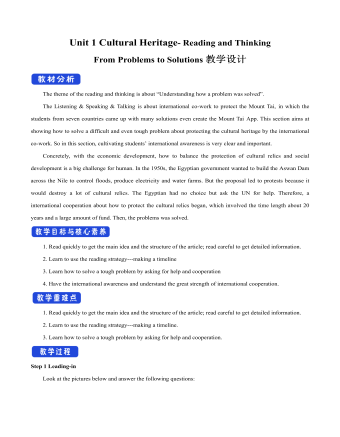
新人教版高中英语必修2Unit 1 Cultural Heritage-Reading and Thinking教案一
The theme of the reading and thinking is about “Understanding how a problem was solved”.The Listening & Speaking & Talking is about international co-work to protect the Mount Tai, in which the students from seven countries came up with many solutions even create the Mount Tai App. This section aims at showing how to solve a difficult and even tough problem about protecting the cultural heritage by the international co-work. So in this section, cultivating students’ international awareness is very clear and important. Concretely, with the economic development, how to balance the protection of cultural relics and social development is a big challenge for human. In the 1950s, the Egyptian government wanted to build the Aswan Dam across the Nile to control floods, produce electricity and water farms. But the proposal led to protests because it would destroy a lot of cultural relics. The Egyptian had no choice but ask the UN for help. Therefore, a international cooperation about how to protect the cultural relics began, which involved the time length about 20 years and a large amount of fund. Then, the problems was solved. 1. Read quickly to get the main idea and the structure of the article; read careful to get detailed information.2. Learn to use the reading strategy---making a timeline3. Learn how to solve a tough problem by asking for help and cooperation4. Have the international awareness and understand the great strength of international cooperation.1. Read quickly to get the main idea and the structure of the article; read careful to get detailed information.2. Learn to use the reading strategy---making a timeline.3. Learn how to solve a tough problem by asking for help and cooperation.

新人教版高中英语必修2Unit 2 Wildlife Protection-Discovering Useful Structure教案一
The activity topic of this section is "report an ongoing event", and the structure is the passive voice of present continuous tense. Rare wild animals are suffering from large-scale poaching, and species are on the brink of danger. Rescue operations are underway. "Being" and "suffering" are the meanings of the present progressive passive voice.The usage of present progressive passive voice is of great importance in writing a good discourse and appreciating some difficult language items, so it is vital to master it and use it flexibly in a context.1. Motivate Ss to deepen the understanding of the usage of present progressive passive voice in a fixed context.2. Enable Ss to master the usage of present progressive passive voice and use it flexibly in a context.3. Lead Ss to construct sentences or appreciate sentences used master it and use it flexibly in a context.1. Help students to appreciate the function of the usage of present progressive passive voice in a sentence2. Instruct students to write essays using the proper usage of present progressive passive voice.Look at the picture and tell me what are workers doing? What is the house being done?

新人教版高中英语必修2Unit 3 The Internet-Discovering Useful Structure教案一
This unit is about the Internet, which has a great influence to our humans and our lives. During the Listening & Speaking & Talking and Reading and Thinking section, the influence in examples has been shown. Thus, use the Present Perfect Tense is appropriate. However, in order to show the justice or weaken the doer of the behavior/action, it’s better to use the Present Perfect Passive Voice than the Present Perfect Tense. Besides, having learned to use the Present Perfect Passive Voice, students can beautify their language in their writing. 1. Learn the structure of the Present Perfect Passive Voice and its functions. 2. Learn to change the sentences with the Present Perfect Passive Voice into the sentences with the Present Perfect Passive Voice. 3. Learn to write sentences with the Present Perfect Passive Voice flexibly according to the context. 1. Learn the structure of the Present Perfect Passive Voice and its functions. 2. Learn to change the sentences with the Present Perfect Passive Voice into the sentences with the Present Perfect Passive Voice. 3. Learn to write sentences with the Present Perfect Passive Voice flexibly according to the context. Step 1 Observe the following sentences, then change the sentences into passive voice.He has been selected to take part in the sports meeting.(肯定句)他已被挑选出来参加运动会。The ink has not been removed from his overcoat.(否定句)墨迹还没有从他外套上去掉。

新人教版高中英语必修2Unit 3 The Internet-Listening &Speaking&Talking教案一
Listening and Speaking introduces the topic of “ask about online habits”. Many middle school students have been surfing the Internet for many years, but what they do with the Internet and how much time they spend every day may not be very clear to themselves, nor to other students. This section allows students to investigate their peers' Internet use, which is conducive to their mutual understanding and understanding of the Internet. It can also help them reflect on their own online behavior, learn from other people's good online habits, and get rid of their bad online behavior.The listening text of this section is an investigation interview. The investigators interview specific groups with the same questions to obtain information, so as to understand their views, practices or attitudes on this issue. There are two specific questions: “how much time do you spend online every day? What do you usually do online?”. The answers of the three respondents provide rich and different information, and achieve the purpose of the investigators. The oral discourse structure of survey interviews generally includes greeting and explaining the purpose of the interview, presenting the interview questions and the respondents' answers. Listening and Talking introduces the theme of “choosing the right application ". Listening text is a conversation between Laura and Xiao Bo. In this part of listening, “oink”; “piggy bank” may cause the students' hearing comprehension limitation. Oink refers to sound word and pig's sound. So, add some oink to my piggy bank is often used to describe "making a little money".1. Guide students to understand the content of listening texts in terms of listening for definitions.2. Cultivate students' ability to define words and understand an investigation interview.

新人教版高中英语必修2Unit 4 History and Traditions-Discovering Useful Structure教案一
Step 5 Practice一、完成下列句子。1. Judy and I _______________(把车停下来(park))in an underground car Park near Trafalgar Square, where we could ______________________(让我们的车充电(charge)).2. When we finally reached the service desk to ask for audio guides, we heard it ___________ that there were no audio guides____________(留下,剩下).3. We__________________________(发现自己对...很惊讶)the large number of visitors and the amount of noise at the entrance of the National Gallery.4. Judy ____________________(眼神专注于) Van Gogh’s Sunflowers. It was hard to approach the painting as there were so many people around.5. She ____________________(把这幅画的复制品装箱(box)) to ensure that it was delivered safely.答案:1.had our car parked get our car battery charged 2. announced left 3. found ourselves very surprised 4. had her eyes fixed on 5. had a copy of the painting boxed二、用过去分词对下列句子进行改写。1. Loch Ness was surrounded by beautiful natural landscape, which made it look amazing.2. Carl and his friend stayed with a generous family who offered them bread with butter and honey that was homemade.3. The family’s ancestors once attended to soldiers who were wounded in the First World War.4. The young people were attracted by the legend of Loch Ness. They watched over the lake with their cameras and binoculars, which were positioned on the hill.答案:1. Loch Ness surrounded by beautiful natural landscape looks amazing.2. Carl and his friends stayed with a generous family who offered them homemade bread with butter and honey.3. The family’s ancestors once attended to wounded soldiers in the First World War.4. The young people attracted by the legend of Loch Ness watched over the lake with their cameras and binoculars positioned on the hill.

新人教版高中英语必修2Unit 3 The Internet-Reading and Thinking教案一
Paragraph 3. Jan decided to start an IT club to teach old people how to use computers and the Internet. Paragraph 4. Jan has started taking online classes to learn more about how to use the Internet to make society better. Paragraph 5. Jan’s life has been greatly improved by the Internet. Step 5: Critical thinking:(1)How do you arrange your time spent on study and the Internet? Is it reasonable? I usually surf the Internet using my mobile phone for only an hour after class, and it is reasonable for me.(2)What are your online activities? Are they safe? I chat with my friends, read news and play games. I never give away my private information so I think they are safe.Step 4: summary Much has been written about the wonders of the World Wide Web. There are countless articles (1)______(tell) us how the Internet has made our lives more convenient. But the Internet has done a lot (2)_____(much) for people than simply make life more convenient. People’s lives (3) _________________(change) by online communities and social networks so far. Take Jan for example, who developed a serious illness that made her (4)_____(stick) at home with only her computer to keep (5)___(she) company. She joined an online group (6)______ she could share problems, support and advice with others. She considered the ability to remove the distance between people as one of the greatest (7)_______(benefit). She was so inspired (8)____ she started an IT club in which many people have been helped. She has started to learn more about how to use the Internet to make society better. Her next goal is to start a charity website to raise money (9)___ children in poor countries. Jan’s life has been (10)______(great) improved by the Internet. Step 5 Homework:Review what we have learned and find out the key language points in the text.

新人教版高中英语必修2Unit 4 History and Traditions-Listening&Speaking&Talking教案一
This unit is about history and traditions. From the opening page, we can know that this unit will introduce the history and traditions around the world. As Marcus Garvey says “A people without the knowledge of their past history, origin and culture is like a tree without roots”, it is important for students to realize the importance and value of knowing the history and traditions and their further meanings. And this part ( listening and speaking ) is divided into two parts: Part A---share views on historic sites, Part B ---talk about a visit to a historic tourist destination. By talking with a foreigner, the speakers introduce the historic attractions and their cultures. Part A is that William, a British student, who was going to visit the Confucius Temple and a Chinese student, Xiao Kong, who was going to the Confucius Temple to meet with the members of the research group, went together and exchanged their views on the Confucius Temple, Confucius, Confucius' descendants and Confucius' educational thoughts. Part B is a conversation between Xiao Yan, a youth hostel receptionist and Paul, a backpacker about the feelings and experience after visiting the Chinese famous tourist attraction Pingyao.1. Guide students to understand the content of listening texts in terms of the whole and key details; 2. Cultivate students' ability to guess the meaning of words in listening; discuss with their peers how to talk about historic spots and great person.3. Instruct students to use functional sentences of showing one’s excitement, surprise and disappointment.1. Guide students to understand the content of listening texts in terms of the whole and key details; 2. Cultivate students' ability to discuss with their peers the related topics.3. Enable students to use the functional items of showing one’s excitement, surprise and disappointment.

新人教版高中英语必修2Unit 4 History and Traditions-Reading and Thinking教案一
Features of languages1.Finally, in the 20th century, the southern part of Ireland broke away from the UK, which resulted in the full name we have today: the United Kingdom of Great Britain and Northern Ireland.该句是一个复合句。该句主句为:the southern part of Ireland broke away from the UK;which resulted in the full name we have today为which引导的定语从句代指前面整句话的内容,we have today为定语从句修饰先行词name。译文:最后,在20世纪,爱尔兰南部脱离英国,这导致了我们今天有的英国的全名:大不列颠及北爱尔兰联合王国。2.Almost everywhere you go in the UK, you will be surrounded by evidence of four different groups of people who took over at different times throughout history.该句是一个复合句。该句主句为:you will be surrounded by evidence of four different groups of people;其中Almost everywhere you go in the UK为让步状语从句; who took over at different times throughout history为定语从句修饰先行词people。译文:几乎无论你走到英国的任何地方,你都会发现历史上有四种不同的人在不同的时期统治过英国。3.The capital city London is a great place to start, as it is an ancient port city that has a history dating all the way back to Roman times.该句是一个复合句。该句主句为:The capital city London is a great place to start; as it is an ancient port city that has a history dating all the way back to Roman times.为原因状语从句;dating all the way back to Roman times为现在分词短语作定语修饰history。

新人教版高中英语必修2Unit 5 Music-Discovering Useful Structures教案一
Step1:自主探究。1.(教材P52)Born(bear) in the USA on 2 January 1970, Whitacre began studying music at the University of Nevada in 1988.2.(教材P52) Moved(move) by this music, he said, “It was like seeing color for the first time.”3.(教材P56)I was very afraid and I felt so alone and discouraged(discourage).4.(教材P58)Encouraged(encourage) by this first performance and the positive reaction of the audience, I have continued to play the piano and enjoy it more every day.Step2:语法要点精析。用法1:过去分词作表语1).过去分词可放在连系动词be, get, feel, remain, seem, look, become等之后作表语,表示主语所处的状态Tom was astonished to see a snake moving across the floor.汤姆很惊讶地看到一条蛇正爬过地板。Finally the baby felt tired of playing with those toys.终于婴儿厌倦了玩那些玩具。注意:1).过去分词作表语时与被动语态的区别过去分词作表语时,强调主语所处的状态;而动词的被动语态表示主语是动作的承受者,强调动作。The library is now closed.(状态)图书馆现在关闭了。The cup was broken by my little sister yesterday.(动作)昨天我妹妹把杯子打碎了。2)感觉类及物动词的现在分词与过去分词作表语的区别过去分词作表语多表示人自身的感受或事物自身的状态,常译作“感到……的”;现在分词多表示事物具有的特性,常译作“令人……的”。
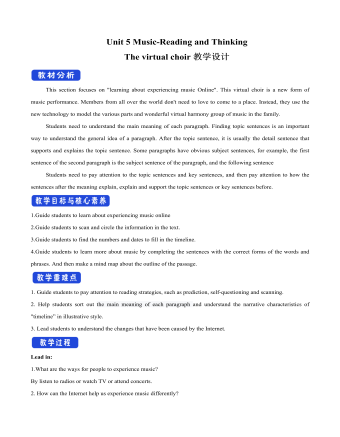
新人教版高中英语必修2Unit 5 Music-Reading and Thinking教案一
This section focuses on "learning about experiencing music Online". This virtual choir is a new form of music performance. Members from all over the world don't need to love to come to a place. Instead, they use the new technology to model the various parts and wonderful virtual harmony group of music in the family. Students need to understand the main meaning of each paragraph. Finding topic sentences is an important way to understand the general idea of a paragraph. After the topic sentence, it is usually the detail sentence that supports and explains the topic sentence. Some paragraphs have obvious subject sentences, for example, the first sentence of the second paragraph is the subject sentence of the paragraph, and the following sentenceStudents need to pay attention to the topic sentences and key sentences, and then pay attention to how the sentences after the meaning explain, explain and support the topic sentences or key sentences before.1.Guide students to learn about experiencing music online2.Guide students to scan and circle the information in the text.3.Guide students to find the numbers and dates to fill in the timeline.4.Guide students to learn more about music by completing the sentences with the correct forms of the words and phrases. And then make a mind map about the outline of the passage.1. Guide students to pay attention to reading strategies, such as prediction, self-questioning and scanning.2. Help students sort out the main meaning of each paragraph and understand the narrative characteristics of "timeline” in illustrative style.3. Lead students to understand the changes that have been caused by the Internet.
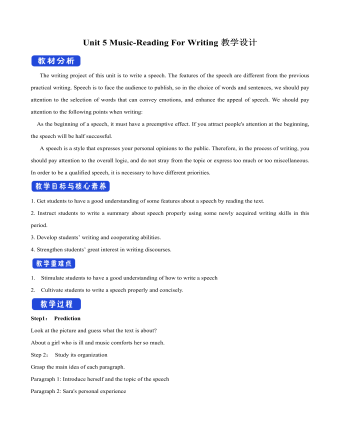
新人教版高中英语必修2Unit 5 Music-Reading For Writing教案一
(4)Now we have heard a number of outstanding speeches ... 我们已经聆听了许多精彩的发言……(5)Because we wanted the nations of the world, working together, to deal with ... 因为我们希望全世界各国团结起来去应对……(6)And if we do not act ... 如果我们不采取行动……(7)Now, I share the concerns that have been expressed ... 我也同意对于……表达的担心(8)Let us show the world that by working together we can ... 让我们告诉全世界,通过一起努力我们可以……(9)It is now time for us to ... 是时候我们……(10)And I have always wished that ... 我一直希望……(11)Thank you for letting me share this day with me.感谢你们和我共度这一天。实践演练:假如你是高中生李华,你校将举办一次以“音乐”为主题的演讲比赛,请你按照主题,写下你的演讲稿。注意:词数100左右。First of all, thank you for listening to my speech. My topic is: love music like love yourself.Music is like the air we need to maintain our normal lives around us. You can't imagine how terrible a world without music would be. Movies and TV shows have no music, only dry conversations and scenes; mobile phones only vibrations; streets only noisy crowds; cafes, western restaurants only depressed meals. What a terrible world it is!As a student, I hope we all can enjoy the fun brought by music in our spare time. Instead of just listening to music, we can even make our own music. Let's enjoy the fun of music!Thanks again for your attention!

新人教版高中英语必修2Unit 3 The Internet-Reading For Writing教案一
⑦identity theft 身份盗窃⑧chat room 聊天室⑨draft your blog post 起草博客帖子⑩post embarrassing photos 张贴尴尬照片 【话题句式】 1. How do you stay safe online and avoid bad experiences on the Internet? 你如何在网上保持安全, 避免在网上的不良经历? 2. I’m not an expert, but many years as a blogger have taught me a thing or two. 我不是专家, 但作为一个博主, 我已经学了好几年了。 3. If you see or read something that makes you feel uncomfortable, leave the site immediately. 如果你看到或读到一些让你觉得不舒服的东西, 立即离开这个网站。4. Don’t give out your address or phone number. 别告诉别人你的地址或电话号码。 5. Identity theft is a common and serious problem. 身份盗窃是一个常见而严重的问题。6. Being online is no excuse for being rude, and you don’t want to become a target for a troll or cyberbully. 上网并不是无礼的借口, 你也不想成为发挑衅帖子的人或网络恶霸的目标。 7. Trolls often use several false names so that they can stay on a site. 发挑衅帖子的人经常使用几个假名, 这样他们就可以留在一个网站上。8. However, the more polite you are, the less likely it is you will be attacked. 然而, 你越有礼貌, 你被攻击的可能性就越小。
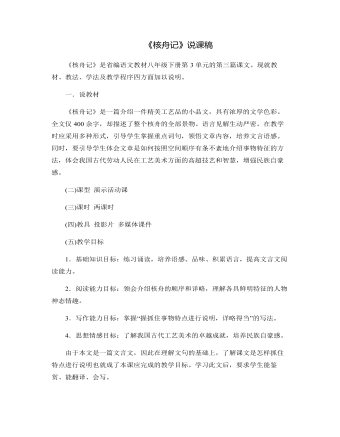
部编版语文八年级下册《核舟记》说课稿
(2)教学内容的设计,一般须遵从学生认知规律,由表及里,由浅入深、完整、生动地呈现事物或事理本身的美学价值。在整体感知课文的艺术美和解决文字障碍之后,通过动手做“核舟”、改写评点“解说词” ,使学生在动手做、动手改、动口说中,理清课文层次和说明顺序。最后,学生们再一次通读全文,使他们的认知经历了从语言文字到形象生动的表象,再到语言文字的完整过程。帮助他们将语言形式和语言内容紧密结合起来。吉尔伯特·海特在其《教学的艺术》一书中曾谈到:“如果我们不能获得一声出自内心的笑,那么这一天的教学就白费了”。通过演课本剧,加深了学生对课文的理解和记忆,有利于培养学生的思考能力,想象能力,逻辑思维能力和语言表达能力。也正是获取一声声出自内心的笑的一种行之有效的方法。
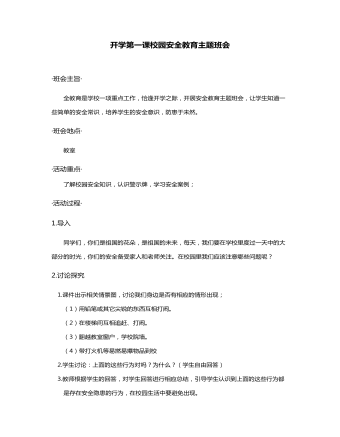
开学第一课安全教育主题班会教案
教师出示相关校园安全知识。(1)食品安全a. 不到没有卫生许可证的小摊贩处购买食品,选择新鲜和安全的食物;注意查看食品的保质期限、配方等安全信息。b. 养成良好的卫生习惯,饭前洗手。 c. 彻底洗净蔬果;不吃霉变的食物;不吃生食;尽量不吃剩菜剩饭。d. 保持健康的饮食习惯,不把饮料当水喝,不吃烧烤、油炸、烟熏及膨化食品,注意三餐定时定量。(2)人身安全 a.有序进出教室,上下楼梯靠右行,不拥挤或互相推搡。 b.在校园追跑打闹。不爬学校的围墙,门窗、围栏、树木、球架。 c.课外活动和体育锻炼,要按有关安全规则进行。在往返家校的路上,要注意交通安全,行路要严格遵守交通规则。 d.不得携带管制刀具,违禁物品进校园。(3)消防安全 a.不携带易燃、易爆、有毒物品等进入校园。 b.若插座、照明灯、电风扇等电器发生故障,不得私自动手排除,应报告教师或总务处,由学校电工进行故障排除。
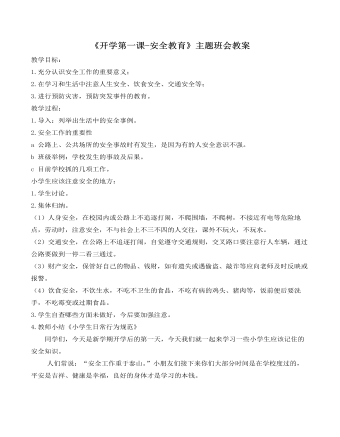
《开学第一课-安全教育》主题班会教案
教学目标:1.充分认识安全工作的重要意义;2.在学习和生活中注意人生安全、饮食安全、交通安全等;3.进行预防灾害,预防突发事件的教育。教学过程:1.导入:列举出生活中的安全事例。2.安全工作的重要性a 公路上、公共场所的安全事故时有发生,是因为有的人安全意识不强。b 班级举例:学校发生的事故及后果。c 目前学校抓的几项工作。小学生应该注意安全的地方:1.学生讨论。2.集体归纳。(1)人身安全,在校园内或公路上不追逐打闹,不爬围墙,不爬树,不接近有电等危险地点,劳动时,注意安全,不与社会上不三不四的人交往,课外不玩火,不玩水。(2)交通安全,在公路上不追逐打闹,自觉遵守交通规则,交叉路口要注意行人车辆,通过公路要做到一停二看三通过。
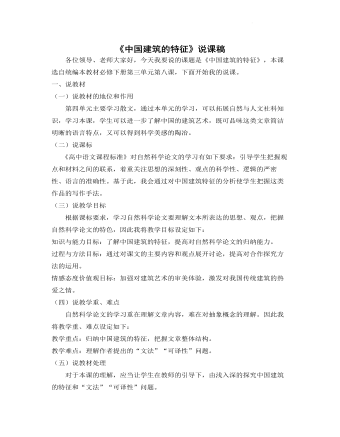
《中国建筑的特征》说课稿 2021—2022学年统编版高中语文必修下册
(二)初读课文,整体感知首先教师对作者进行简单介绍,再要求学生速读课文,让学生初步感知课文内容,归纳全文思路,边读边思考PPT上的问题。问题:全文可以分成几部分?此环节意在激发学生的学习主动性,培养学生的自学能力。读毕,我会对学生的自学情况进行检查反馈,鼓励学生踊跃发言,说出自己理解的写作思路,最后教师对学生的答案进行概括和总结,此环节能够让学生对中国建筑的特征整体把握,夯实学习本文的基础,同时感知课文,理清文章脉络,实现长文短教,为析读本文作好铺垫。(三)析读课文,质疑问难此环节是教学的重要阶段,在这里,我会以新课标为基准,做到阅读指向每一个学生的个体阅读,同时在教学过程中遵循启发性,循序渐进性的原则。此环节运用小组合作学习法、讨论法和问答法分析中国建筑的特征。同学每四人为一小组讨论PPT上展示的问题。
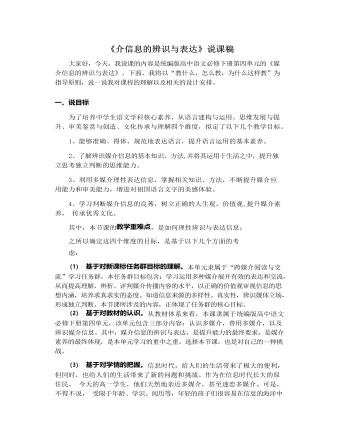
《媒介信息的辨识与表达》说课稿-2021-2022学年统编版高中语文必修下册
②癌症患者在治疗过程中,会有很大的身体损耗,而黄鳝有很好的滋补作用,适当吃一点黄鳝,既能够为患者补充营养,也能够提高患者的身体免疫力。 (来源于报纸)经过讨论交流,每一组一名同学自主发言,老师点拨,最后形成小结。看来源 要权威发布,不要道听途说看内容 要事实清晰,不要模糊遗漏看立场 要客观公允,不要情绪煽动看逻辑 要严谨准确,不要简单断言情感判断 理性判断 理性表达(四)活动三,重实践新课标提到,语文课程应引导学生在真实的语言运用情境中,通过自主的语言实践活动,积累经验,把握规律,培养能力。据此,我设计了以下贴近学生生活、可参与性强的活动。多媒体展示案例,仍然是先讨论交流,再自主发言,说出案例有哪些问题。这是某校园论坛上的一则寻物启示。
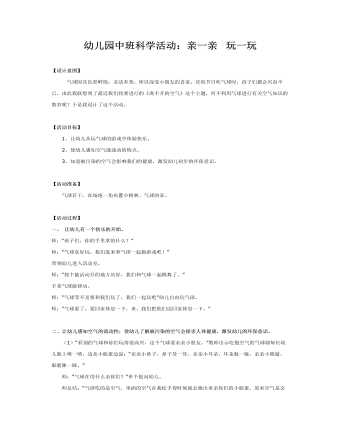
中班科学活动:亲一亲 玩一玩课件教案
【活动目标】1、让幼儿从玩气球的游戏中体验快乐。2、使幼儿感知空气能流动的特点。3、知道被污染的空气会影响我们的健康,激发幼儿初步的环保意识。 【活动准备】 气球若干、在场地一角布置小树林、气球的家。 【活动过程】 一、让幼儿有一个快乐的开始。师:“孩子们,你的手里拿的什么?”师:“气球真好玩,我们进来和气球一起做游戏吧!”带领幼儿进入活动室。师:“找个能活动开的地方站好,我们和气球一起跳舞了。”手拿气球做律动。师:“气球等不及要和我们玩了,我们一起玩吧”幼儿自由玩气球。师:“气球累了,要回家休息一下,来,我们把他们送回家休息一下。”
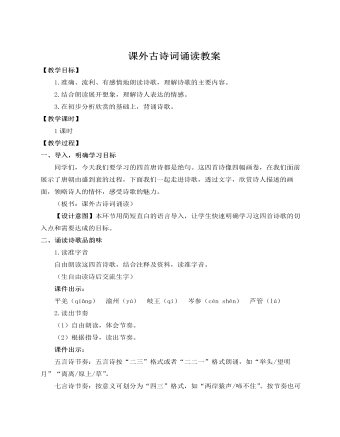
人教部编版七年级语文上册课外古诗词诵读(一)教案
(1)示例一(横向联想) 李白的送别诗:①“思君不见下渝州”,表达依依惜别的无限情思,可谓语短情长。②“仍怜故乡水,万里送行舟”,意思是“我”还是怜爱故乡的水,流过万里送“我”远行。这一句运用了拟人的修辞手法,将故乡水拟人化,借写故乡水有情,不远万里,依依不舍送“我”远别故乡,表达了诗人离开故乡时依依不舍、思念故乡的感情。③“孤帆远影碧空尽,唯见长江天际流。”这两句看起来似乎是写景,但在写景中包含着一个充满诗意的细节。李白一直把朋友送上船,船已经扬帆而去,而他还在江边目送远去的船帆。李白望着帆影,一直看到帆影逐渐模糊,消失在碧空的尽头,可见目送时间之长。帆影已经消失了,然而李白还在翘首凝望,这才注意到一江春水,在浩浩荡荡地流向远远的水天交接之处。“唯见长江天际流”,是眼前景象,可是谁又能说是单纯地写景呢?李白对朋友的一片深情,李白的向往,不正体现在这富有诗意的神驰目注之中吗?诗人的心潮起伏,不正像那浩浩东去的一江春水吗?
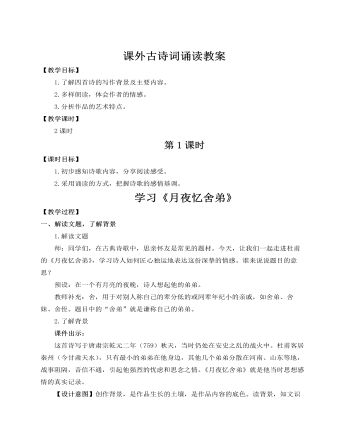
人教部编版语文九年级上册课外古诗词诵读(一)教案
二、初读,解读“早行”,感受意象的丰富1.寻读意象课件出示:诗人围绕“早行”一词,写了哪些典型特征的细节、景物?如何体现“早行”?学生自由诵读、思考交流。教师点拨:颔联十种景物的十个名词——鸡、声、茅、店、月、人、迹、板、桥、霜。一词一景,让我们获得广阔的想象空间,组成意韵丰富的画面。这就是古典诗歌的“意象叠加”法。预设:诗歌中处处体现“早行”,如“晨起动征铎”(清晨起床,车马铃声叮叮当当),“鸡声茅店月”(鸡鸣早看天),“人迹板桥霜”(莫道君行早,更有早行人),“枳花明驿墙”(“明”反衬“天暗”,说明“早”)。2.延读意象叠加的诗句课件出示:(1)枯藤老树昏鸦,小桥流水人家,古道西风瘦马。(马致远《天净沙·秋思》)(2)楼船夜雪瓜洲渡,铁马秋风大散关。(陆游《书愤》)(3)细草微风岸,危樯独夜舟。(杜甫《旅夜抒怀》)(4)桃李春风一杯酒,江湖夜雨十年灯。(黄庭坚《寄黄几复》)

